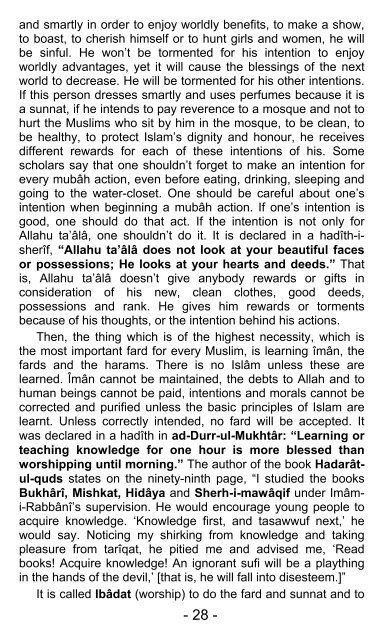1 - Endless Bliss - Hüseyin Hilmi Işık
1 - Endless Bliss - Hüseyin Hilmi Işık
1 - Endless Bliss - Hüseyin Hilmi Işık
You also want an ePaper? Increase the reach of your titles
YUMPU automatically turns print PDFs into web optimized ePapers that Google loves.
and smartly in order to enjoy worldly benefits, to make a show,<br />
to boast, to cherish himself or to hunt girls and women, he will<br />
be sinful. He won’t be tormented for his intention to enjoy<br />
worldly advantages, yet it will cause the blessings of the next<br />
world to decrease. He will be tormented for his other intentions.<br />
If this person dresses smartly and uses perfumes because it is<br />
a sunnat, if he intends to pay reverence to a mosque and not to<br />
hurt the Muslims who sit by him in the mosque, to be clean, to<br />
be healthy, to protect Islam’s dignity and honour, he receives<br />
different rewards for each of these intentions of his. Some<br />
scholars say that one shouldn’t forget to make an intention for<br />
every mubâh action, even before eating, drinking, sleeping and<br />
going to the water-closet. One should be careful about one’s<br />
intention when beginning a mubâh action. If one’s intention is<br />
good, one should do that act. If the intention is not only for<br />
Allahu ta’âlâ, one shouldn’t do it. It is declared in a hadîth-isherîf,<br />
“Allahu ta’âlâ does not look at your beautiful faces<br />
or possessions; He looks at your hearts and deeds.” That<br />
is, Allahu ta’âlâ doesn’t give anybody rewards or gifts in<br />
consideration of his new, clean clothes, good deeds,<br />
possessions and rank. He gives him rewards or torments<br />
because of his thoughts, or the intention behind his actions.<br />
Then, the thing which is of the highest necessity, which is<br />
the most important fard for every Muslim, is learning îmân, the<br />
fards and the harams. There is no Islâm unless these are<br />
learned. Îmân cannot be maintained, the debts to Allah and to<br />
human beings cannot be paid, intentions and morals cannot be<br />
corrected and purified unless the basic principles of Islam are<br />
learnt. Unless correctly intended, no fard will be accepted. It<br />
was declared in a hadîth in ad-Durr-ul-Mukhtâr: “Learning or<br />
teaching knowledge for one hour is more blessed than<br />
worshipping until morning.” The author of the book Hadarâtul-quds<br />
states on the ninety-ninth page, “I studied the books<br />
Bukhârî, Mishkat, Hidâya and Sherh-i-mawâqif under Imâmi-Rabbânî’s<br />
supervision. He would encourage young people to<br />
acquire knowledge. ‘Knowledge first, and tasawwuf next,’ he<br />
would say. Noticing my shirking from knowledge and taking<br />
pleasure from tarîqat, he pitied me and advised me, ‘Read<br />
books! Acquire knowledge! An ignorant sufi will be a plaything<br />
in the hands of the devil,’ [that is, he will fall into disesteem.]”<br />
It is called Ibâdat (worship) to do the fard and sunnat and to<br />
- 28 -




